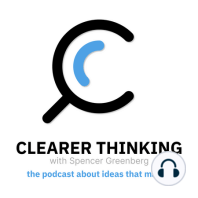58 min listen

Poker and Productivity with Chris Sparks
Poker and Productivity with Chris Sparks
ratings:
Length:
87 minutes
Released:
Mar 24, 2021
Format:
Podcast episode
Description
What can people learn from playing poker? What makes someone good at playing games? What is the OODA loop? What is a "premortem" analysis of decision-making? How should we think about decisions that aren't easily (or even possibly) reversible? What do people get wrong when they're trying to be more productive? What is a "forcing function"? How can people create their own forcing functions?Chris Sparks is a professional poker player and the founder and CEO of Forcing Function. You can find his full bio here, follow him on Twitter at @SparksRemarks, or find more of his work via these links:Experiment Without LimitsPerformance AssessmentLunch HourWritingFurther reading:OODA Loop
Released:
Mar 24, 2021
Format:
Podcast episode
Titles in the series (100)
Spencer Greenberg @ THINKERS Workshop by Clearer Thinking with Spencer Greenberg